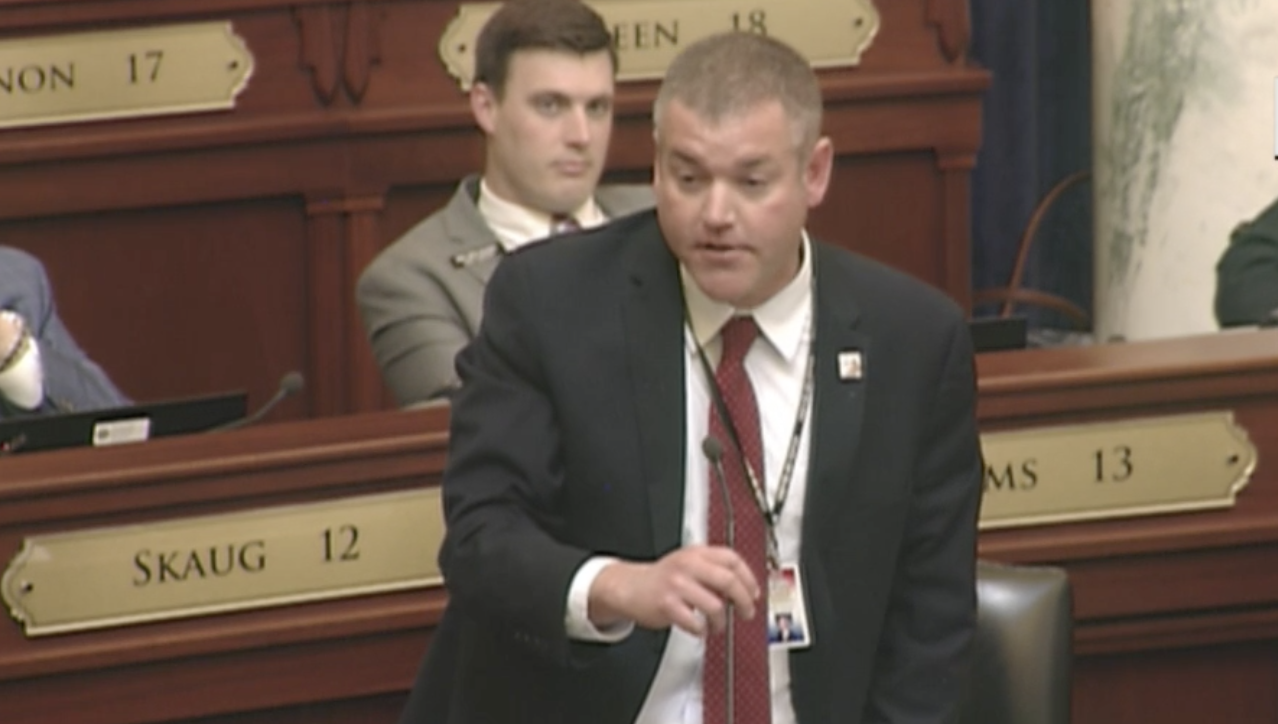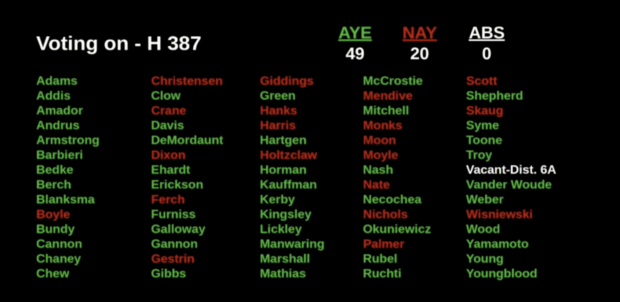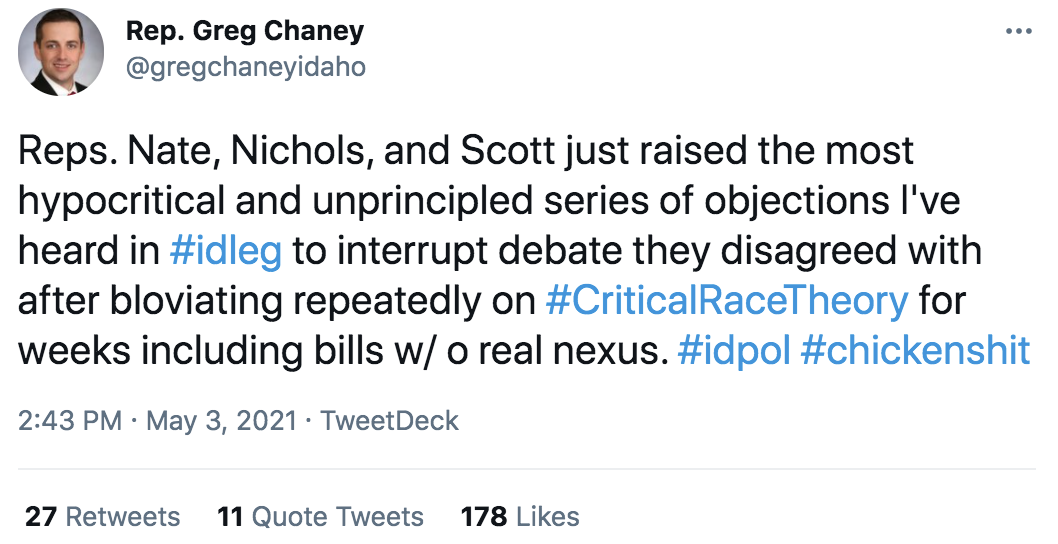
Over the course of Monday afternoon, the House finally broke a logjam on several key education budgets — including the contentious higher education budget.
The House approved the higher ed budget on a 49-20 vote. The higher ed budget still needs to pass the Senate, but Monday’s House vote was critical. In mid-March, the Senate approved a similar, and slightly larger, spending plan for Idaho’s four four-year institutions; the House overwhelmingly rejected this budget on April 7.
The new, House-approved edition of the higher ed budget earmarks about $313.1 million in tax dollars. That’s about $2 million less than Gov. Brad Little requested, and about $2 million less than the first version of the budget.
All told — including tax dollars, student tuition and fees and other funding — the budget allocates more than $629.8 million for the four-year institutions.
The new version of the budget cuts $2.5 million designed to eliminate and discourage social justice programs — $1.5 million from Boise State University, and $500,000 apiece at the University of Idaho and Idaho State University. The budget would provide an additional $400,000 to Lewis-Clark State College, in hopes of allowing the college to balance its books without a tuition increase.
Not surprisingly, social justice was a recurring theme in Monday’s House debate. While conservatives said the budget didn’t go far enough to curb social justice programs, several Republicans invoked House Bill 377 —the state’s controverisal and recently signed anti-indoctrination law.
“We have made a strong policy statement against discrimination,” said Rep. Wendy Horman, R-Idaho Falls.
At one point, Rep. Caroline Nilsson Troy, R-Genesee, scolded conservatives for belaboring the indoctrination issue, saying higher education leaders have gotten the message.
“They’re not dead, they’re Ph.D.’s,” Troy said.

Monday’s debate encapsulated the higher education debate that has stretched across the 113-day session — the third-longest session in state history:
- Ron Nate, R-Rexburg, pushed for killing this budget and writing in an additional $18 million in cuts — mirroring talking points from the Idaho Freedom Foundation. The foundation has said pegged the costs of social justice programs at $20 million a year, but has repeatedly ignored requests for details.
- Heather Scott, R-Blanchard, urged the House to split this budget bill into four bills — one for each of the state’s four-year institutions. Conservatives have pushed for splitting the budgets so it can consider the cost of social justice programs at each institution, separately.
- As a person of color, Rep. Chris Mathias said he was “saddened” by the tone of the debate over social justice programs, saying the controversy is having an adverse effect on students and the state’s business community. “I can’t settle for vagaries anymore,” said Mathias, D-Boise. “I need to hear actual stories.”

Monday afternoon’s floor session was tense and truncated. Nate, Scott and Rep. Tammy Nichols, R-Middleton, took turns objecting to Mathias’ debate and comments on critical race theory and social justice. House Speaker Scott Bedke paused the debate briefly — and then the House went into recess for two hours, allowing committees to meet.
Monday’s higher ed House vote represents one key milestone on the path to adjourning the 2021 legislative session, the third-longest session in state history. Monday was Day 113 for this year’s session, five days shy of the record, set in 2003.
Teachers budget breezes through the House
Twenty days after the House voted down a $1.1 billion teacher salary budget, it was a completely different story Monday.
With no debate, the House passed the salaries budget on a 68-0 vote.
The largest of the state’s seven K-12 budget bills, House Bill 385 is essentially unchanged from its predecessor. The only change is a $1 million increase, for additional teacher training.
The biggest change, however, is timing. The passage of HB 377 was clearly a factor in Monday’s unanimous vote. When opponents voted down the initial teacher salaries bill, lawmakers spent little time talking about the budget itself, or teacher pay raises. Instead, they focused on the specter of social justice and critical race theory instruction in schools, offering anecdotal evidence but no specifics.
In effect, HB 385 would cover two years of pay raises under the state’s teacher salary career ladder, funding raises placed on hold last year, in the wake of the pandemic.
Also moving quickly Monday, the House passed two other K-12 budgets:
The House passed the K-12 “operations” budget, also on a 68-0 vote. That budget covers a host of school line items: salaries for classified staff, such as classroom paraprofessionals and bus drivers; school technology; transportation; and discretionary funding that helps districts and charters cover employee benefit costs.
Late Monday, the House passed a bill authorizing the state and schools to spend more than $454 million in federal coronavirus stimulus funding. The money comes from the American Rescue Plan Act, passed in March. The bill drew limited opposition, with Nate urging colleagues to reject the federal funding in the interest of fiscal conservatism. “We’re the gatekeepers for this. There’s nobody else who can say no to the federal government.” The bill passed, 56-10.
Both budgets now go to the Senate.
Education budgets glide through Senate
Nearly unchallenged and never debated, four education budgets easily passed Monday, as the Senate returned to business. the
“We’ve been waiting for these,” said Sen. Janie Ward-Engelking, D-Boise, kicking off a string of unanimous and near-unanimous votes on the House-passed budgets.
Here’s what the Senate passed:
A budget that helps pay the salaries of administrators such as principals and superintendents. Under House Bill 353, the budget will see a 2 percent bump next school year, plus increased funding for charter schools that have taken on more students during the pandemic. The bottom line: The budgets spell out a 3.8 percent funding increase in K-12 state spending.
A children’s programs budget, which mostly doles out money from federal coronavirus relief packages. House Bill 356 would pay for programs such as the state’s Advanced Opportunities program, which pays for high school students to attain college credits through dual credit classes and Advanced Placement tests. In line with federal guidelines, much of the money, sourced by the December federal relief package, will go to combatting pandemic-induced learning loss.
A “central services” budget, House Bill 358, which pays for items such as technology and curriculum, mostly with state general fund money. Some federal relief will be used to fund the budget, too.
House Bill 372 would pay for broadband improvements and administration of federal relief money through a mix of federal and state dollars. It would also fund a slew of education budget lines. Unlike the other budgets, which passed unanimously, HB 372 passed on a 33-1 vote.
All four bills now go to Gov. Brad Little’s desk.
Idaho Education News covered some of Monday’s hearings remotely.
